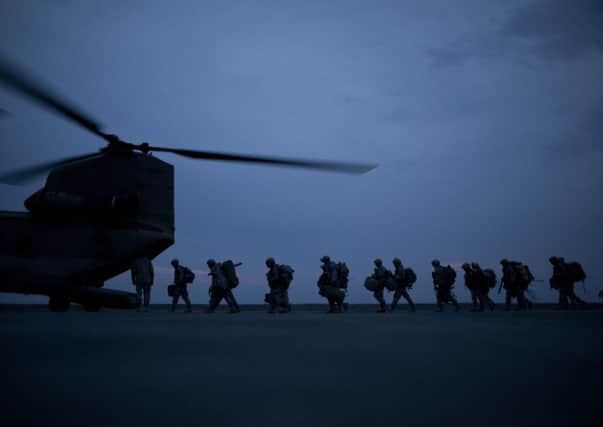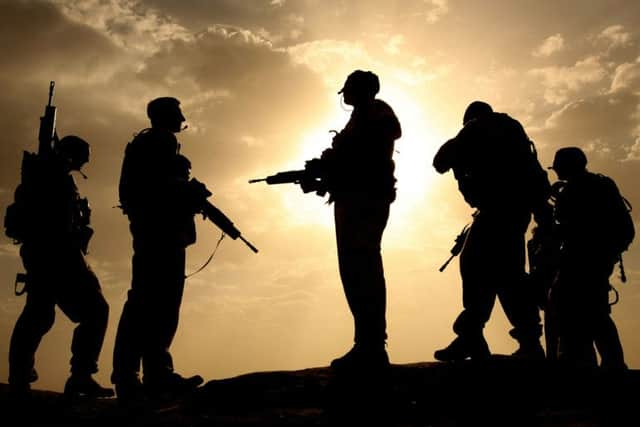The Write Stuff: To Helmand and back


She wouldn’t be the mother. You can’t, really. After the battles and the helicopters you can’t come storming in with advice about raincoats. There was something different about Luke as he sat across from her. Not determined, but achieved. Some people would have counted it a loss in him because it seemed that the softness had gone. Looking at him, listening to his low murmur as he spoke about the flat and the joy of sleeping in his own bed, she felt she was looking at Sean.
‘You look good,’ she said. But she wasn’t sure. His life was telling on him. He didn’t know he was young and he probably never would: any day now he’d be thirty, then thirty-five, then you’re in your forties with that tremendous sense of no turning back and nothing really proved. It would take a nice woman to renew his spirit and get him on the right track. That’s what she thought. Alice was conjuring with the next set of problems before the present ones had settled.
Advertisement
Hide Ad‘This and that,’ he said, answering her question. ‘I’ve been walking a lot. I went up north. Climbed a bit. And I went down south to see about things.’ She ordered the Pinot Grigio. She thought it overpriced but it was the nicest they had by the glass. She saw he was more anxious now and shorter of breath and she tried to shelve the feeling that he was more available now, as victims are. He wasn’t a victim, he was somebody who needed time, she thought. Time was a thing they couldn’t prescribe at the chemist. The waiter came with two small cups of Cullen Skink.


‘Gordon will tell you all about it when he comes,’ she said. ‘He’s making gallons of it now for his company. You know about his company, don’t you – Homeland Fisheries?’
‘He’s selling fish soup?’
‘Well, you know. Prepared fish products. Ready to cook. Instructions in the pack. Fishcakes. Mussels. He won an award for best home delivery company.’
‘Good old Gordon,’ Luke said.
‘He’s all right,’ Alice said. She paid her dues to Luke’s mocking tone. ‘He works hard.’
‘It’s a busy life,’ said Luke. ‘Smoked haddock.’
She giggled, took a sip. He noted a certain fierceness about her, the pursed lips, the eyes. He could tell she wanted to get close to him by having an argument. Families do that. But he’d been away a while and wasn’t sure he could face any of it.
‘Aren’t you proud?’ she asked.
‘Of what?’
‘Scotland.’
‘I know we’re supposed to feel proud. But maybe we ought to earn that feeling.’
‘You have earned it.’
‘No, I haven’t.’
Advertisement
Hide Ad‘Everybody feels proud, Luke.’ She drank nervously from her glass and put her elbows on the table.
‘Before we get totally leathered on national pride,’ he said, ‘maybe we should first work out how to be proud of being in the human race. I would like that. I would like that first.’
‘You were fighting for your country.’
Advertisement
Hide Ad‘I was fighting for Flannigan and Dooley. For Lennox and Scullion. Is that a nation?’
‘Your friends? It kind of is, Luke.’
‘There’s no nation, Mum. There’s only people surfing the Net. People like your husband sending cod in parsley sauce to people in France. And the money pouring into your life via PayPal. And every person imagining the world as he wants to see it, just like the guy in the turban behind the wall with an explosive vest who thinks he’s going to Allah. He thinks he loves his country, too. And he thinks his country is being exploited. And he thinks his pals are a nation.’
‘You don’t believe that, Luke. You were brought up in a country with traditions and you loved them.’
‘It’s a game, Mum. A great game. We only believed in it for as long as it lasted. I love my country for its hills and its inventions, not for its sense of injury, not for its sentimental dream that’s there nobody like us. I’ve been out in the world and I can tell you they’re all bloody like us: desperate and tired and fighting for a way into the modern world. I don’t know what convinced you that building walls would make you better inside.’
‘You’re on the wrong page. It’s changed. This country has a flag!’
‘Dump the flags and the drums and the pipes. They’re for the museum. Like all the junk of all the nations.’
Advertisement
Hide Ad‘Those countries you’ve fought in want to kill us. Those people hate civilisation.’
‘Oh, Mum. Stop reading the Daily Mail. The band of people who want to kill us are just psychopaths and criminals. They won’t last. And they’ve never even heard of Scotland. Jesus, those people couldn’t point to their own country on a map.’
Advertisement
Hide Ad‘But you can.’ She went on to tell him he was rootless and cynical. It was a nice conversation, hopeless, going nowhere, but full of the possibilities they each denied. They came alive arguing with each other and so did the country.
‘I might be rootless,’ he said, ‘but I’m not cynical. I love improvement, but I can tell you it doesn’t often arrive in a tank.’
‘Well, remember where you come from,’ she said, ‘if you care for improvement. That’s what we do up here. That’s what we’ve been doing for years now.’
‘Don’t rest on your laurels.’
‘You come from here, Luke.’
‘Do I? I come from here? People come from a lot of places now and a young person’s sense of humanity won’t confine itself to Dundee.’
‘Oh, Luke!’
‘Don’t Oh-Luke me. Those people in Afghanistan are poorer than you could ever imagine, and they can’t read the books containing the words that they’re willing to die for. But the biggest armies in the world can’t stop them imagining. That’s the truth. They want their tribes and they want their enemies. And so do we.’
‘Oh, my,’ she said. ‘Some nations are decent, Luke, and if they want to spread that to backward places then it’s worth it.’
Advertisement
Hide Ad‘Decency?’ Luke said. ‘Do you know why I’ve been drummed out of the army, Mother? Do you want to know exactly? Because my group went into a village where there was a wedding. A small village. People preparing food and playing games and looking after goats. And we were led into a trap but we massacred the whole fuggen lot of them. We sprayed them with bullets. We weren’t even supposed to be there. It wasn’t part of the mission. But we killed them all. Some of those boys were no more than thirteen or fourteen.’
‘I’m sure you –’
‘Don’t be sure, Mum. Don’t be. I was out of my fuggen head.’
‘Don’t swear, son.’
Advertisement
Hide Ad‘It was a slaughter in broad daylight. We were smoking spliffs. We were listening to heavy metal. Scots boys. Irish boys and others. All from proud nations. All from freedom-loving nations with statues to philosophers. And then we went into this village …’
‘Son.’
‘No. It was chaos. You want decadence? You want rootlessness? Come to Bad Kichan. I could’ve fired bullets into every building. Into the lady in the wedding dress and the old men and the animals, too. All of them. Just blood. Just the enemy. I didn’t know if I was firing for decency or just gaming. It wasn’t real to me and it’s not real to anybody. So. That’s what I’ve been doing on my holidays, Alice.’
‘Good Lord.’
‘Don’t talk to me about proud nations. That was me. Spreading decency to the world because we have so much to spare.’
‘Oh my.’
‘Those battles are over, Mum. There is no monopoly on decency. I’ll never put a uniform on again. Because I shamed it.’
‘No.’
‘I shamed it and it shamed me.’
ABOUT THE AUTHOR
Andrew O’Hagan has been described as one of his generation’s most exciting and most serious chroniclers of contemporary Britain. He has twice been nominated for the Man Booker Prize, was voted one of Granta’s Best of Young British Novelists in 2003, and has won the Los Angeles Times Book Award and the EM Forster Award from the American Academy of Arts & Letters. He lives in London. His latest novel, The Illuminations, is both a deeply charged story of love and memory and of the harsh realities of the Afghan war.
• The Illuminations by Andrew O’Hagan is published by Faber, price £17.99
FOLLOW US
SCOTSMAN TABLET AND MOBILE APPS